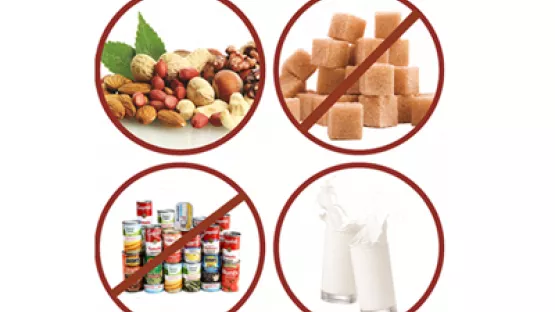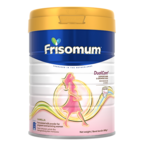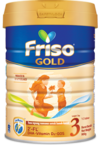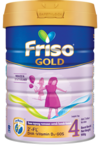Easy Pregnancy Exercises at Home
Here are some easy home workouts for pregnant women to help move you t.... read more

The food you were eating before your pregnancy may not be adequate when you're growing a child. With a healthy diet, you should gain an additional 7kg to 18kg of weight during pregnancy9. If you are carrying twins, you could gain upwards of 16 to 20kg9. This additional weight includes your fully grown child, a placenta, amniotic fluids, an expanded uterus, maternal breast tissue, maternal blood, other fluids in maternal tissue, maternal fat, and nutrient stores9.
Your child will make up only a fraction of the additional mass needed to support them in the womb and beyond. You will need an excess of proteins, calories and other nutrients to ensure healthy foetal development and to maintain your own well-being as your body changes.
It is important to adjust your diet early during pregnancy to help your child build a strong immune system. Here are some of the recommended foods for the first trimester.
Refined carbs like white bread and white rice are processed and stripped of most of their natural nutrients, fibre, vitamins and minerals. When you find out that you are pregnant, you should trade some of these everyday foods for brown bread, dried beans, peas, or potatoes baked or steamed in their skins. They are a source of complex carbs that provide more nutrition and less damaging blood sugar level changes, making them top choices among food to have during pregnancy
Also known as Vitamin B9, folic acid helps you produce new red blood cells to support you during pregnancy and birth. It also helps your child develop a healthy central nervous system10. Low folic acid intake during pregnancy can cause neural tube defects in the brain, spine or spinal cord which can lead to paralysis at birth11. Naturally occurring folic acid can be found in popular foods for those in their first trimester like dark leafy vegetables like spinach, kale, romaine lettuce and collard greens11. You can ask your doctor for supplementary folic acid tablets if you are particularly concerned about skull and spinal defects11.
These should be familiar as some of the most frequently touted nutrients for a healthy pregnancy. These nutrients are building blocks for your child’s brain, nervous system and eyes. Have more amounts of fully-cooked deep sea fishes like herring, sardine, tuna (canned light) and mackerel that are naturally high in Omega-3 fatty acids.
Yes, supplements are also part of the foods or diet plan that you should have during pregnancy. Your healthcare provider may prescribe pills to boost your body's Vitamin A, B Complex, C, D, calcium and iron over the course of your pregnancy. Take these supplements with water, as they will best help your body efficiently absorb the much-needed nutrients.
Here comes the big list of food and drinks you need to avoid from the start of your pregnancy. It can be a hassle, but these are necessary sacrifices you must make to ensure both you and your child stay healthy and develop as well as possible.
The good news is that caffeine is safe for pregnant women and you can have your steaming hot cup of coffee at any time of the day. However, you should avoid having more than 200mg of caffeine—two mugs of tea or instant coffee, or one mug of filter coffee. Too much coffee may result in your child being underweight at birth, having a faster heartbeat and breathing rates, and also having difficulty sleeping.
Topping the list of what not to eat during pregnancy is alcohol, because it is a toxin that slows down our nervous system. Alcoholic women often have a low birth weight, birth defects, learning difficulties or social problems. Alcohol also increases the risk of miscarriage, premature birth, and foetal alcohol spectrum disorders (FASD). It isn't clear exactly how much alcohol is required to cause foetal development issues, so it is not advisable for pregnant women to drink any amount of alcohol during pregnancy.
Speaking of food to avoid during pregnancy, raw food definitely stays on top of the list too. Any raw or undercooked fish, shellfish, meat and eggs should be avoided. That does mean you have to give up sushi dishes that contain raw fish, sunny side up eggs and medium-rare steaks. Raw shellfish, raw meat and raw eggs could contain harmful types of bacteria and parasites that put you at risk of contracting salmonella or toxoplasmosis, both of which have been linked to miscarriage, stillbirth and other serious health issues in developing foetuses.
Potential faecal contamination during growth and harvest means vegetables and uncooked flour could also carry the same risk of salmonella. Always opt to get fully-cooked food and vegetables that are thoroughly washed for your salads.
Soft cheeses with rinds are less acidic and contain more moisture than hard cheeses. As a result, they are more likely to become ideal environments for harmful bacteria to grow. Whether they are made from pasteurised or unpasteurised milk, cheeses such as brie, blue brie, camembert and taleggio could contain listeria bacteria and should not be eaten during pregnancy. Listeria can cause listeriosis, miscarriage and stillbirth. Some pasteurised soft cheeses are safe to eat—so long as they are made from pasteurised milk and do not have a rind.
Certain seafood should be avoided at all costs during pregnancy, such as shark, swordfish, king mackerel, tilefish and large tuna that may contain high levels of mercury. Mercury increases the risk of birth defects in the brain and nervous system. As a rule of thumb, the larger and more long-lived the fish, the more mercury it is likely to contain. As such, light canned tuna made from a smaller breed of fish is safe to consume than whole tuna steaks sliced from larger fishes.
However, do note that "canned white" tuna made from albacore have been found to contain three times the mercury level than the safer "canned light" tuna made from comparatively smaller skipjack tuna.
Another two on the list of what not to eat during pregnancy are fast food and rich foods. Your digestion system will be slower while pregnant. Heavy food like nasi lemak, roti canai, or foods that are rich in chocolate and cheese may cause indigestion, bloating, acid reflux and gastritis.
Many herbs and herbal teas have yet to be proven to be safe for pregnancy and birth. There has been anecdotal evidence that some herbal medication can lead to excessive bleeding during delivery or cause severe keloids to form. To be on the safe side, it is best to avoid folk remedies unless a certified healthcare professional has given you the go-ahead to continue or start using them.
Lastly, try not to skip meals. Any diet that requires intermittent fasting should be put on hold when you are pregnant. Go ahead and sate any food cravings you may have, ice cream, cookies and all—provided they're in moderation and not one of the listed foods you should avoid. There may be days where all your body can tolerate are starchy and carb-heavy potatoes or pasta. It's more important to keep yourself full than starve otherwise. That said, pregnancy symptoms like morning sickness could get in the way of eating three full meals a day. You can break up your usual meals into smaller portions to be eaten at multiple food breaks throughout the day, and buy healthy titbits like fruits and nuts to snack on. It may take a bit of planning to make sure no meals are skipped, but it will be worth it in the long run. Now that you have a full view of what not to eat during pregnancy, here’s another important thing to know: the importance of maternal milk!
Designed specially for pregnant women, maternal milk comes with ample benefits for both the mother and the growing foetus. Ranging from quality of life improvements to nutritional benefits, here are the reasons why maternal milk is a must-have while you are pregnant:
Maternal milk directly contributes to the mother’s folic acid intake, which in turn helps with the growth of the foetus.
During pregnancy, the amount of blood in your body increases by 20% to 30%1. That means your body needs more red blood cells to make up for it. Maternal milk helps the body generate more red blood cells to combat this as it contains folic acid. Meanwhile, its calcium content also promotes the foetus’ development of teeth and bones2.
Maternal milk actually helps reduce the likelihood of nutrient loss that may result from morning sickness or vomiting that are common in pregnant women. On top of that, it also reduces the risks of multiple sclerosis, neonatal rickets and osteoporosis2.
Consuming maternal milk directly contributes to healthy weight gain. There is a lot of emphasis on having a nutrient-rich diet whilst pregnant, and milk is an essential part of a nutrient-rich diet3.
To address the specific needs of mums-to-be, maternal milk is often recommended as it helps balance both your and your child’s nutritional needs safely. We have formulated Frisomum® Gold with both mum and child in mind, and its unique Dual Care+ formula supports you on your pregnancy journey. Some of the vital nutrients that Frisomum® Gold provides you with include:
Vitamin B12 - Needed for red blood cell production and the healthy functioning of the nervous system6.
Folic Acid - Folic acid is essential for growth and division of cells. Folate plays a role in the formation of red blood cells. Folate helps to maintain the growth and development of the foetus7.
Iodine - Essential for the formation of thyroid hormones, which supports brain development8.
Vitamin D - Vitamin D is necessary for the absorption and utilisation of calcium and phosphorus4.
Calcium - Helps in the normal growth and development of bones and teeth5.
Low glycemic index - The glycaemic index (GI) is a rating system for foods containing carbohydrates. It shows how quickly food affects your blood sugar (glucose) level when eaten on its own. The low glycemic index (GI) could help the mother avoid being overweight during pregnancy.
When you consider pregnancy milk powder, it is also best to consider the origins of the milk, the process of manufacturing, nutrient content as well as one which helps you control weight gain during pregnancy. Frisomum® Gold preserves the natural nutrients of the milk to give you what you need in your pregnancy journey. Now that you are aware of the importance of maternal milk/susu, check out what Frisomum® Gold has to offer now!


